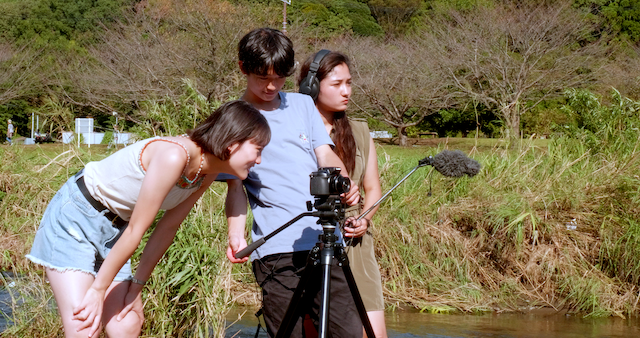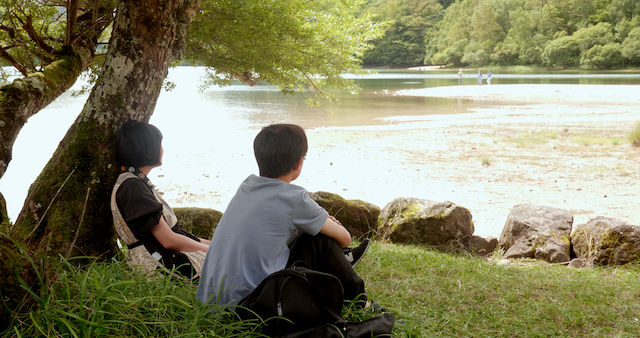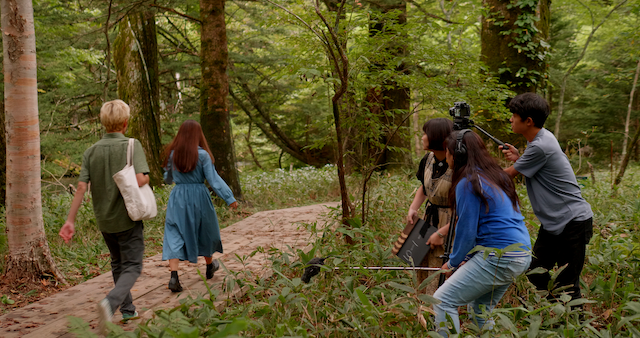
©Courtesy of Japan Cuts
There is less parental supervision in this film than you see in an average John Hughes movie. Perhaps as a result, these teens hardly spend any time working or studying during their summer break—maybe a little, but not a lot. However, they are not idle slackers. In fact, they keep quite busy with their own project: making a movie.
Eventually, they discover, as those who regularly review cinema can well attest, bringing a film to a successful conclusion is often the trickiest part. It will take several tries for them to come up with the final ending for both the movie they are making and the one they are in. The latter, real-life film happens to be director-screenwriter Kota Nakano’s Retake, which screens as part of this year’s Japan Cuts.
When Yu Mizuguchi sees Kei Sekino taking pictures in the park, she decides he should serve as the cameraman on the movie she wants to shoot. Mizuguchi is not the type to take “no” for an answer and Sekino has a hard time saying it, especially to her. He recruits his friend, Jiro Aihara, to play the romantic co-lead opposite Mizuguchi’s friend, Umi Hashimoto. Soon, the on-screen couple becomes an off-screen couple as well. However, Sekino ruins the potential symmetry when he cluelessly invites Mizuguchi’s estranged friend and former bandmate Alisa Ogawa to handle the film’s sound recording.

©Courtesy of Japan Cuts
Nakano clearly implies there is more to Mizuguchi’s strained relationship with Ogawa then either is willing to reveal. However, it is obvious to everyone that Sekino carries a torch for Mizuguchi, except maybe Mizuguchi. Regardless, no adults interfere in their business, even when misfortune strikes. Of course, when that happens, it is time to try another ending (or a retake, so to speak).
Indeed, Nakano’s film has several endings. Yet, even though they are sometimes prompted by scenes of Sekino editing their work, the film never feels meta or multi-versal. Instead, Nakano appears to be having fun with narrative forms in much the same way Hong Sang-soo did in his more playfully structured films, such as Hill of Freedom and Right Now, Wrong Then.
Regardless, it is a mistake to get hung up on Nakano’s narrative gamesmanship at the expense of his affectionate portrayal of youthful exuberance and old-fashioned teen angst. You can practically smell the flowers and feel the summer sun on your face throughout Retake. Nakano leans into the lazy, hazy atmosphere, but the teen characters still keenly experience a wide range of emotions, as they flirt, pine for each other, and resent slights (both real and exaggerated). Appropriately, Mizuguchi’s fictional film depicts two teen lovers considering whether they should run away to land where time is frozen, potentially preserving their perfect moment of teenaged love for all eternity.
©Courtesy of Japan Cuts
Mizuguchi can be difficult, but Urara’s confidently brash (and secretly insecure) performance is quite endearing. Muta Yuto is painfully nebbish as Sekino, but in ways that are easy to relate to. Ryusei Chiba and Nako Ohara have nice romantic chemistry together, while supplying gentle comic relief as Aihara and Hashimoto. However, Areina Takano arguably delivers the film’s subtlest and most complex performance as Ogawa.
Thematically, Retake might remind some Japan Cuts patrons of Kazuya Konaka’s Single8, a thoroughly charming film that screened at last year’s festival, about a group of teens who decide to remake Star Wars for a class project, but end up producing an entirely original and much more personally meaningful film. Retake is less interested in the film-within-the-film than the relationships between the teens, but the similar concept remains an equally solid foundation to build upon.
Arguably, Nakano’s teens act like Gen Z’ers who inhabit a Gen X kind of world (updated with modern technology). They just want to do their own thing heedless of the rest of the world, but that works out well enough, since there are largely left to their own independent devices. Regardless, it is hard not to feel nostalgic watching Retake. Even if you did not go to school in Japan, Nakano taps into universal teen attitudes and neuroses. Recommended for its bittersweet vibe and vicarious spirit of youthful enthusiasm, Retake screens during this year’s Japan Cuts: New York’s Festival of New Japanese Film.
Grade: B+
If you like the review of the film, share your thoughts.

